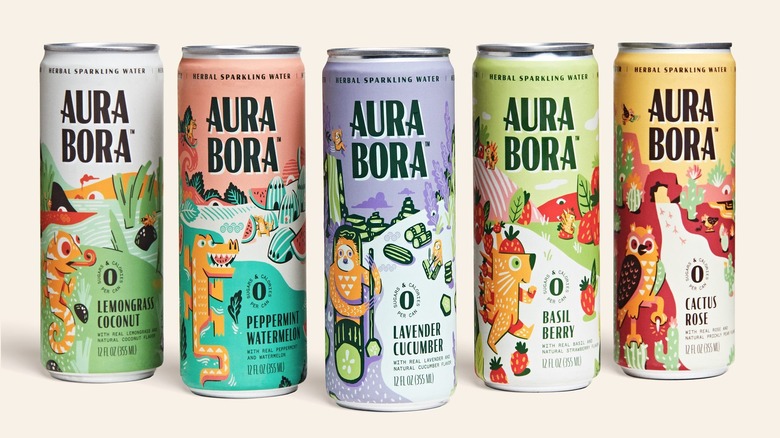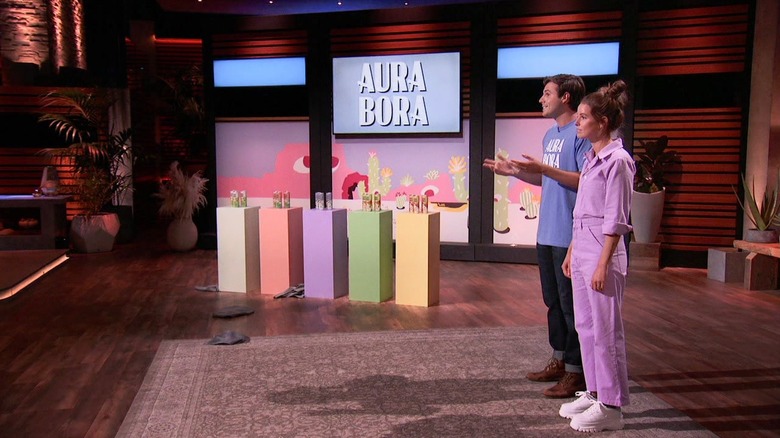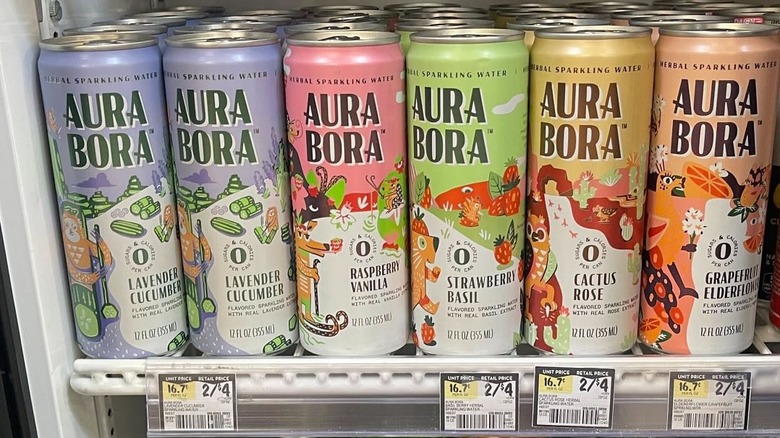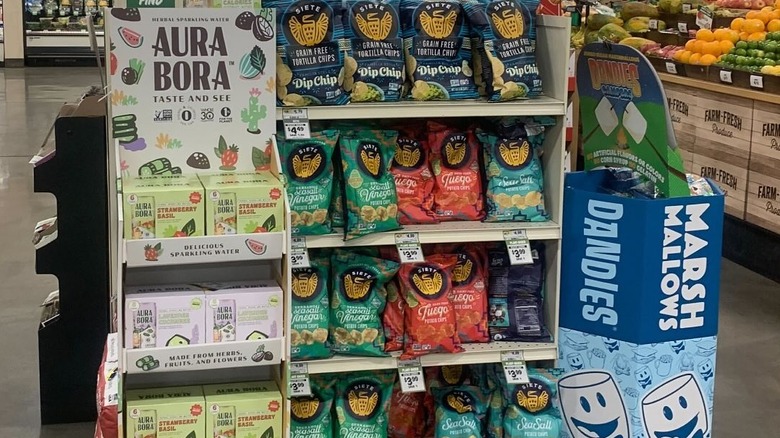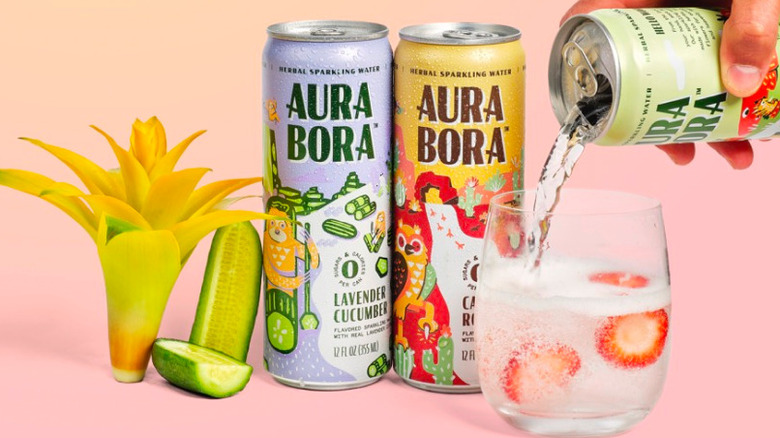Whatever Happened To Aura Bora From Shark Tank?
The unique sparkling water beverage Aura Bora didn't come together with some massive Kickstarter campaign or business moguls with a plan to get rich quick. It started with a SodaStream, a lot of curiosity, and years of testing. In 2019, husband-and-wife founders Paul and Maddie Voge were tired of the same uninspired sparkling water that had been around for ages; the usual citrus-heavy flavors just weren't cutting it.
So they began experimenting with botanicals that evoked more of a farmer's market than a convenience store. Lavender Cucumber was their first hit, followed by combinations like Cactus Rose, Basil Berry, and Lemongrass Coconut. Their goal was to give people something bubbly that didn't taste artificial, use added sugar, or remind you of someone else's product.
Aura Bora also employed whimsical branding which utilized bold pastels, fantastical animal mascots, and a tone that oozed "weird-on-purpose" energy, which helped it stand out in a crowded beverage market. The combination of packaging and nutritional content — no sugar, no sodium, and only five all-natural ingredients — quickly found traction at local markets and co-ops. By the time they appeared on "Shark Tank" in early 2021, Aura Bora had already carved out a niche for itself among flavor-curious consumers and wellness-eager millennials.
The Voges entered the Tank with a quiet confidence that made the Sharks perk up. They received more than one offer, and ultimately chose to shake hands with Robert Herjavec. Aura Bora was different, and they were destined for success with a Shark in their corner.
What happened to Aura Bora on Shark Tank?
Aura Bora's pitch on Season 12, Episode 11 of "Shark Tank" was vibrant, much like their cans. Co-founder Paul Voge opened by asking for $150,000 in exchange for 5% equity. His presentation dove into the brand's playful identity, but what really got the Sharks' attention was the company's early traction.
The Voges stated that Aura Bora had generated $200,000 in sales over just five months and was already in 500 retail locations, including Whole Foods and Foxtrot. However, Paul Voge later admitted that they weren't officially picked up by Whole Foods at the time of filming, and hoped that mentioning it would appear more favorable to the Sharks.
But their direct-to-consumer sales were climbing, thanks in part to a strong aesthetic appeal and quirky, earnest social media presence. The company wasn't profitable yet, but Paul explained that their margins would improve with scale and they were focused on growth through brand loyalty and niche appeal.
Guest Shark Daniel Lubetzky passed on investing, saying the sparkling water market felt too niche for his tastes. Lori Grenier and Mark Cuban also dropped out, citing lack of passion for the product and the challenges of managing large-scale inventory, respectively. But the pitch wasn't a bust; both Kevin O'Leary and Robert Herjavec made offers.
O'Leary proposed $150,000 for 5% equity, plus a five-cent royalty per can until he recouped $300,000. Herjavec countered with a more straightforward offer of $150,000 in exchange for 12% equity. After some back and forth, he and the Voges agreed on $200,000 for 15% equity.
Aura Bora after Shark Tank
After "Shark Tank" aired, Paul Voge shared that Aura Bora experienced a huge surge in visibility and orders, saying they made more money in the next four days than in the previous four months. The company also received outreach from a wide range of customers and retailers, many of whom had never heard of Aura Bora before the episode. Voge emphasized how valuable the exposure was, even beyond the deal itself, highlighting how "Shark Tank" acted like a sort of national commercial for their brand. He explained that the fulfillment was initially overwhelming due to the volume of orders, but the attention ultimately helped solidify Aura Bora's place in the market.
By the end of 2021, Aura Bora's retail presence had expanded. The drinks started popping up in Sprouts, Thrive Market, Fresh Market, and even some Cost Plus World Market locations. Social media played a big role, too. The brand's Instagram and TikTok accounts amped up the surreal, pastel-toned humor while maintaining transparency about the brand's journey and challenges, which attracted more customers. People love sparkling drinks (as well as their ability to keep you hydrated), and Aura Bora capitalized on that while reaping the benefits.
Is Aura Bora still in business?
Aura Bora currently releases small-batch drops every quarter that keep fans coming back; these include eclectic combos like Apple Cinnamon, Green Bean Casserole (yes, really), and Guava Eucalyptus, which tend to sell out quickly, thanks to clever packaging and well-timed social media buzz.
While creating delicious flavors are their core mission, Aura Bora is also focused on sustainability. Every can is made from eco-friendly aluminum, and the company has partnered with 1% for the Planet, donating 1% of annual sales to environmental nonprofits focused on conservation and climate action. Aura Bora also offers a free and paid membership program for access to discounts and benefits.
Customers who join their subscription program enjoy exclusive perks like 10% off every order and free shipping, with deliveries arriving like clockwork on the first Tuesday of each month. Members can also swap flavors, skip a shipment, or cancel anytime. Additionally, you'll earn store credit just for signing up, referring friends, or making regular purchases, which means that loyal fans stay stocked and save cash, all while supporting a greener future.
What's next for Aura Bora?
Aura Bora is entering a new phase of growth, thanks to an acquisition by Brooklyn-based investment firm Next In Natural. The February 2025 deal handed over a majority stake in the company, with the goal of scaling Aura Bora's reach through a shared services platform. CEO Paul Voge remains at the helm, but his focus is now entirely toward product innovation, which makes sense, given that limited-edition and unexpected flavor drops have always been a core part of Aura Bora's identity.
With support from Next In Natural's team — known for scaling brands like Chobani, Hu, and La Colombe — Aura Bora gains access to operational, marketing, and supply chain infrastructure that will help it compete with bigger names in the "better-for-you" beverage space. As Next in Natural COO Kristine Laurel said in a statement, "Aura Bora is positioned to thrive with comprehensive support that will strengthen their supply chain and support future innovation." The acquisition is also expected to boost Aura Bora's ability to roll out new partnerships and seasonal flavors without sacrificing quality or supply.
